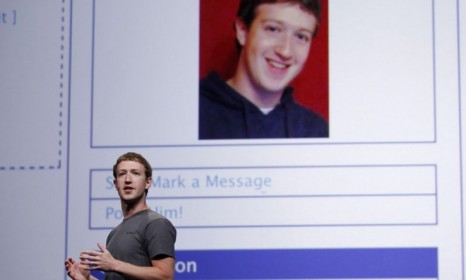Facebook's 'flurry of announcements': 8 highlights
Mark Zuckerberg unveils a host of big changes to the world's most popular social network. Here's what you need to know

A free daily email with the biggest news stories of the day – and the best features from TheWeek.com
You are now subscribed
Your newsletter sign-up was successful
Facebook's "flurry of announcements" at its f8 developers' conference on Thursday all point to one ambitious goal: Convincing the social network's 800 million users that they don't ever need to leave Facebook. Facebook's many offerings pretty much break down into two categories, says Mike Isaac at Wired. There's the much-discussed "Timeline," which seeks to present your life to the world via a digital scrapbook of sorts; and a new universe of apps to keep you informed and entertained. Here, a look at eight of the highlights from Facebook's big makeover:
1. The Timeline
The Timeline will replace your current profile page with a curated, image-heavy "stream of information about you — the photos you've posted, all your status updates, the apps you've used, even the places you've visited on a world map — that scrolls all the way back to your birth," says Chris Taylor at Mashable.
The Week
Escape your echo chamber. Get the facts behind the news, plus analysis from multiple perspectives.

Sign up for The Week's Free Newsletters
From our morning news briefing to a weekly Good News Newsletter, get the best of The Week delivered directly to your inbox.
From our morning news briefing to a weekly Good News Newsletter, get the best of The Week delivered directly to your inbox.
2. The Ticker
The Ticker is "intended to be a lightweight feed of updates that won't annoy your friends," says Tom Cheredar at VentureBeat. Important updates from friends will still show up on your news feed. But who your friend Tom killed in "Mafia Wars"? That sort of trivial alert goes straight to the Ticker. This is "Facebook's assault on Twitter," says Roberto Baldwin at Gizmodo.
3. Gestures
"Remember when all you could do to something on Facebook — a video, a comment, a product, a person — was Like it?" asks Mashable's Taylor. Thanks to a new tool called Facebook Gestures, "that's going to seem laughably antiquated." Soon, developers will be able to turn any verb into a Facebook button. You might broadcast that you're "Reading" a book or "Watching" a movie, without having to note if you are enjoying the experience. "As many observers have pointed out," notes Taylor, "this is likely to lead to an explosion of oversharing."
A free daily email with the biggest news stories of the day – and the best features from TheWeek.com
4. Music
The centerpiece of Facebook's new social sharing push is Open Graph — the "vaguest" but most far-reaching addition unveiled at f8, says VentureBeat's Chereder. It allows Facebook users to read, watch, or listen to content right in Facebook — activities that will then be posted in your news feed. (Users would first have to give Facebook permission to post this sort of info.) So you can now listen to music in Facebook using streaming services Spotify, MOG, and Rdio, among others, and your friends not only see what you're listening to — they can listen to it, too. That will be great when online radio sites like Myxer and Pandora launch Open Graph apps, says Eliot Van Buskirk at Evolver.fm. But with subscription services like MOG and Spotify, you can only listen to your friends' songs if you also subscribe to that service. "Bummer."
5. News
News purveyors like The Washington Post, Yahoo News, Mashable, and The Daily have already jumped on the Open Graph wagon, allowing Facebook users to read and implicitly recommend full articles within Facebook. The idea is that tons of Facebook junkies never leave the site, says VentureBeat's Chereder, and if they "aren't going to seek news and information outside of the social network, the news media will bring articles to them." This eager rush to "publish 'Facebook Editions'" is pathetic, says Ryan Tate at Gawker. Facebook won't solve the new media's problems any more than the iPad did.
6. Movies and TV
Movie studios have been testing renting movies on Facebook for months, but Thursday brought new partnerships with video-streaming services Hulu, Netflix, and others. As with music, what you watch will be added to your news feed. "The upshot, says Mashable's Taylor, is "a brand-new kind of media-based peer pressure." Netflix CEO Reed Hastings, on stage with Facebook's Mark Zuckerberg, said that seeing what your friends are watching would likely be even more helpful than Netflix's own "You might like..." algorithm.
7. "Lifestyle apps"
Zuckerberg highlighted a new class of "lifestyle" apps for Facebook that will let users automatically share things like what they cook, how much they exercise, or what they are shopping for. "The best way I can describe this new evolution of Facebook apps," says VentureBeat's Chereder, is that they "grew up, graduated from college, and are now just as useful as they'd be on other platforms (iOS, desktop, Android, etc.)." There's also a competitive edge, says Ina Fried in All Things D. "The more popular an app is with one's friends, the more likely a user is to see it on their feed," and the more likely the app will thrive.
8. Comedy
The f8 conference ushered in many big changes for Facebook, but it also debuted a "considerably more playful and at ease" Zuckerberg, say the AP's Barbara Ortutay and Michael Liedtke. That was evident even before he took the stage, when Saturday Night Live comedian Andy Samberg started the keynote for him, reprising his Zuckerberg impersonation. (Watch the video below.) Bravo, says Gawker's Ryan Tate. Anyone gutsy enough to pay "a comedian to remind you he's awkward with girls, chloroforms competitors, and pushes users into fake friendships" might just earn forgiveness for "getting rich off your private information."